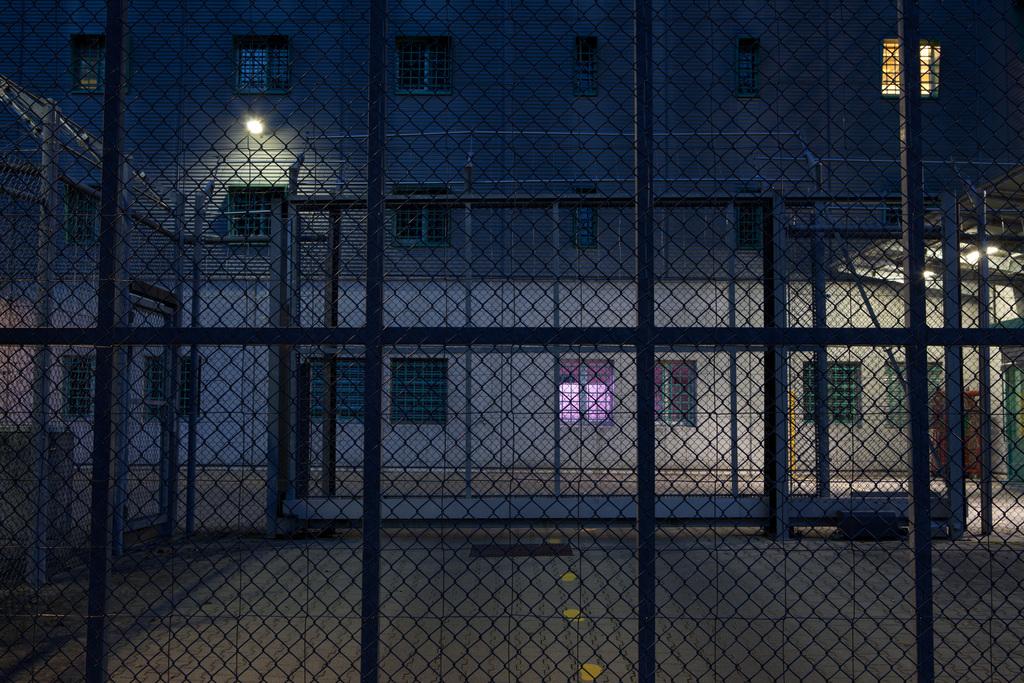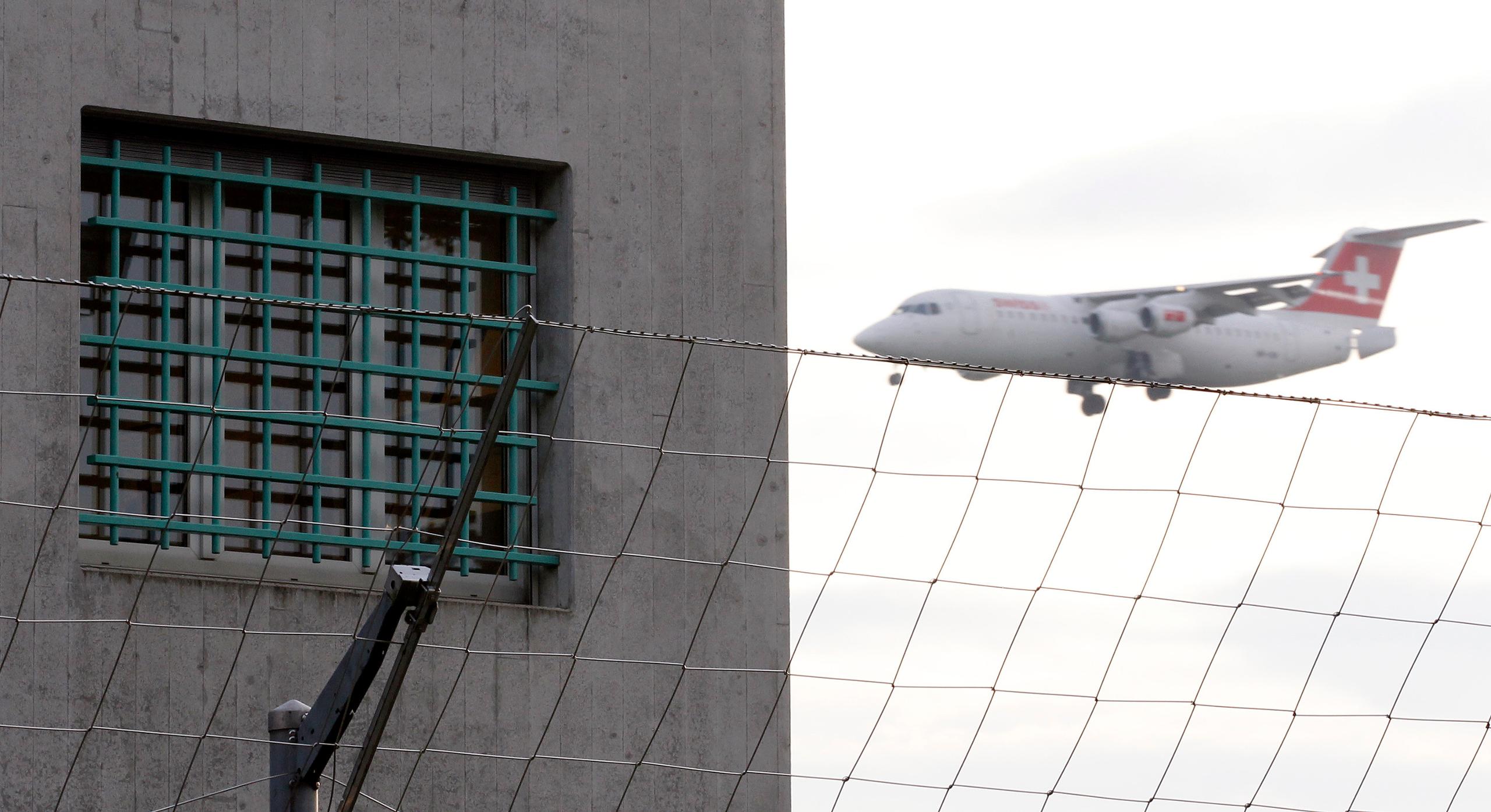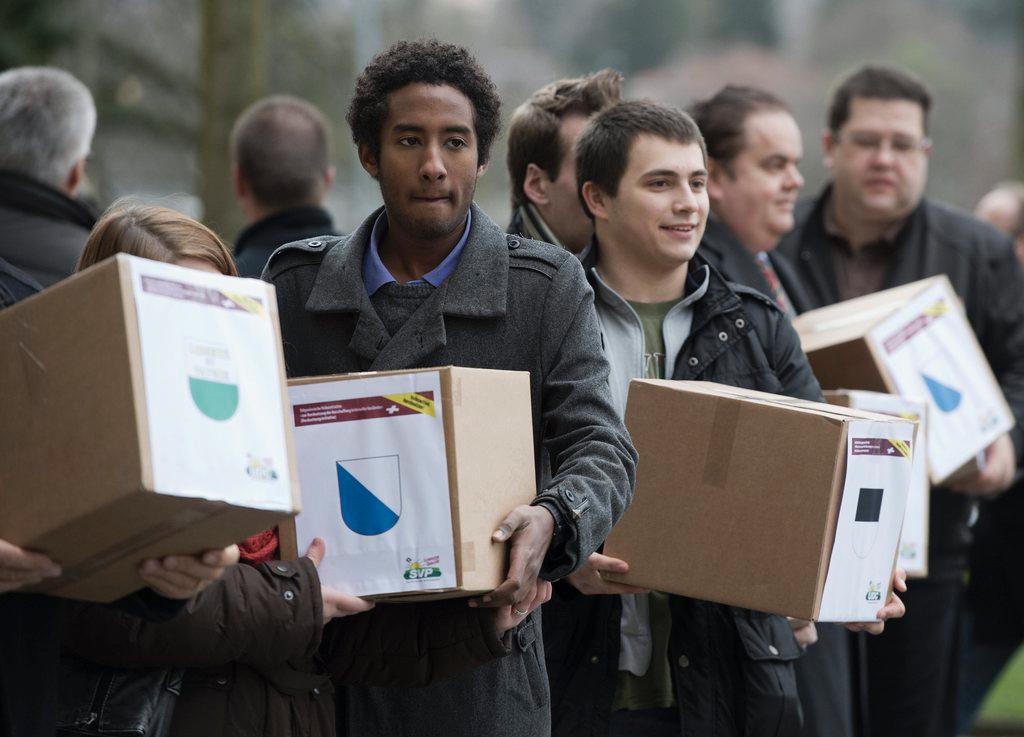Move to expel foreign criminals takes aim at judicial discretion

Frustrated that its 2010 initiative to expel foreign criminals has been watered down by parliament, the latest initiative from the Swiss People’s Party would force judges to automatically expel foreign criminals, regardless of individual circumstances.
At three-and-a-half pages long, the proposed textExternal link that the conservative right People’s Party wants inserted into the constitution is about ten times longer than most other initiatives. The reason for this is that contrary to what is in the fundamental charter, the initiative does not describe a general principle but sets out a catalogue of offences that would incite automatic expulsion from Switzerland for anyone who does not hold a Swiss passport – even if they are Swiss-born.
It’s a first. Should the initiative pass, it would bring the penal code directly into the constitution. Parliament would have no say in it.
The senate, along with many others in legal circles, is against the idea. In December, all the senators – except the five belonging to the People’s Party and independent Thomas Minder – signed a declaration opposing the initiative.

More
Deportation initiative back before voters
Manual for expulsion
The extraordinary revolt by the senators was swiftly followed by another equally extraordinary revolt by academics.
In mid-January, 160 law professors from across the country signed an appeal for citizens to vote “no” when the initiative is put to a vote on February 28. Titled “Switzerland is a country of law”, the signees condemned the initiative as aiming to “remove the power of discretion from judges”. The appeal said the federal constitution should not be “distorted in to a kind of manual for expulsion”.
“Our appeal unites many professors of public, administrative and international law in Switzerland,” says Tobias Jaag, who co-authored the text with colleague Andreas Auer.
Auer, founding director of the Centre for Research on Direct Democracy (c2d)External link, says the initiative “aims to effectively remove any margin of discretion from judges. The People’s Party wants automatic expulsions, made without consideration and discretion and independently of the particular case of the person concerned. As soon as you commit a relatively serious crime once – or a slightly less serious crime twice within ten years – then you’re out!”
Specifically, somebody arrested for growing cannabis plants on the balcony and who, nine years later, insulted a police officer during an altercation outside a restaurant, would be considered sufficiently dangerous for the judge to order automatic expulsion.
The 2010 initiative to expel foreign criminals passed with 53% of the vote. Former federal judge, lawyer and law professor Martin Schubarth had already condemned that as “a scandal”. He says the People’s Party is now “cheating” by presenting the current initiative as “the will of the people”.

More
Deportation initiative violates human rights
“Obviously if you say ‘let’s kick out foreign criminals’, the people are going to say yes,” says Schubarth.
“But if you posed the question on a case-by-case basis, I’m sure that a large majority would refuse to expel this or that person simply because they don’t hold a Swiss passport.”
The possibility to examine cases individually is also defended by Andreas Auer, who points out that it is the role of the judge.
“The people cannot judge. The people make rules but only judges can apply the rules,” says Auer. Specifically, judges are responsible for taking into account the principle twice written into the constitutionExternal link (Art. 5 and 36) calling for the actions of the state to be “proportionate to the desired outcome”.
The principle of proportionality
People’s Party law professor and recently elected parliamentarian Hans-Ueli Vogt sees the issue differently. For him, “the system must operate to standards which embody the principle of proportionality in general. This principle does not enter into every decision of every court on every individual case”.
Vogt cites, for example, murder cases for which the penal code in principle restricts judges from pronouncing a sentence of less than ten years imprisonment.
“You also have the case of the driver who is clocked doing 140 km/h on the highway. Even if that person is alone, has not put anyone in danger and thinks it is disproportionate, he must pay the fine. So we already have obligatory standards which limit the margin of discretion of the courts. And that’s good because the verdict should not be left to the subjectivity of the judge,” argues Vogt.

More
Criminal foreigners should be expelled from Switzerland
As a state of law, Switzerland also ascribes to the separation of powers and the justice system is reputed for its independence. How will judges juggle automatic expulsion with the principle of proportionality?
“They will be faced with unbearable conflicts of conscience,” says Schubarth.
Auer says “it is not out of the question that judges will continue to do their innate duty anyway, which is to look at each case in detail and to decide by taking into consideration the entirety of the circumstances, including family, professional and personal circumstances of the person concerned”.
But Vogt says the situation is clear: “In principle, one must admit that a more recent and solid standard should win out over the general principle”. In other words, the initiative should outweigh the principle of proportionality already written into the Constitution – even if Vogt himself has personal reservations about the impact of the initiative on “secondos”, the second-generation foreigners born in Switzerland.
The question of secondos raises Schubarth’s hackles.
“If this initiative passes it will mean that Switzerland, as a country of humanity, no longer exists,” he says, citing the example of a case he presided over involving an Austrian – born in Switzerland and completely integrated – who had killed his wife.
“At the time, we refused to expel him even though the penal code gave us the option. Because unfortunately there are several Swiss each year who kill their wives, and nobody finds it intolerable that they remain in Switzerland,” notes Schubarth. “On the other hand, when it comes to tourists who have no connection to the country and come simply to commit a crime, then I agree we must be very severe.”
Two and a half times more expulsions
The penal code provides judges with the option to expel a foreign criminal, but the sentence is rarely applied. In the absence of federal statistics, the best estimates based on local figures amount to a few hundred cases a year.
Following a request from the Federal Office of Justice, the Swiss Federal Statistical Office recently published its calculation of the number of expulsions likely to occur under the hardening of laws already voted by the parliament and those wanted by the People’s Party.
Had the implementation law already been in place in 2014, Switzerland could have expelled almost 4,000 people. With the current initiative, that number could rise to more than 10,000. However, these figures are only estimates, because if the initiative passes, nobody can predict what the judges will do.
Translated from French by Sophie Douez

In compliance with the JTI standards
More: SWI swissinfo.ch certified by the Journalism Trust Initiative






You can find an overview of ongoing debates with our journalists here. Please join us!
If you want to start a conversation about a topic raised in this article or want to report factual errors, email us at english@swissinfo.ch.